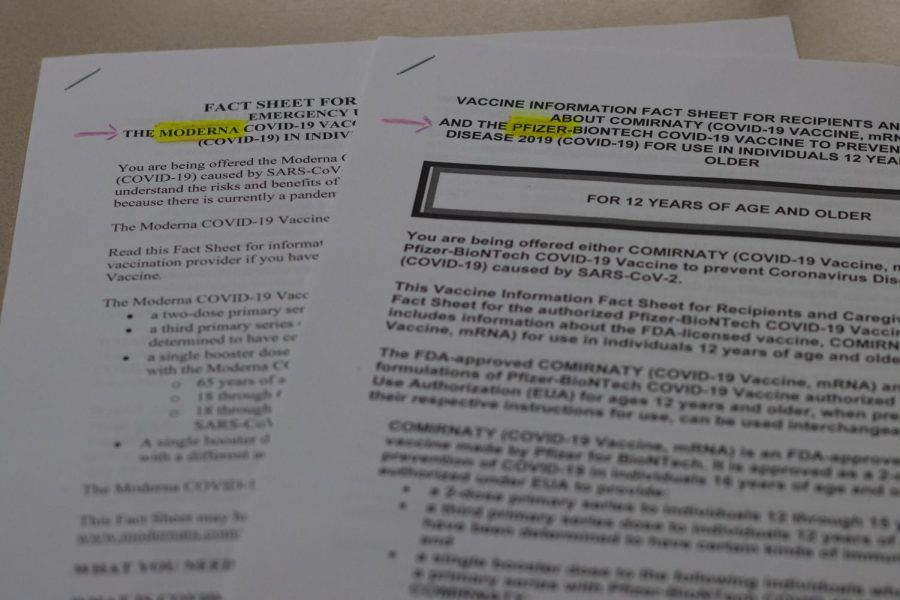Boosters, Symptoms, and Severity: Everything You Need To Know About Omicron
The omicron variant now accounts for 59 percent of all reported COVID-19 cases.
January 12, 2022
The recent rise in school closures, canceled flights, disappearance of available COVID-19 tests, and the increased infection rate of coronavirus globally, can all be attributed to one thing, omicron.
What is omicron?
Omicron is a variant of the original COVID-19 virus. This mutation of the virus follows others that have emerged during the past two years. It is very contagious, and although it is a variant of COVID-19, many doctors and researchers have reported that it is extremely different from the original virus.
Where did omicron first originate?
The omicron variant first originated in South Africa and Botswana. The first cases were identified in early November 2021. This variant has ripped through every other continent on the globe, caused a surge in cases everywhere, and is calling into question whether or not another shutdown is in order.
Why is it called omicron?
To avoid confusion among the public, the World Health Organization (WHO) has stated that they will name all emerging variants after Greek letters instead of hard-to-pronounce names, or what seems like random letters and numbers combinations. Omicron was named after the fifteenth letter in the Greek alphabet.
What is a variant?
A variant is a mutation of a previous virus. Viruses are constantly changing and adapting, so new variations of that virus can emerge with different symptoms and characteristics and can be even more deadly or transmissible, though they can also be less transmissible and deadly as well. All variants and repercussions of variants differ from one another.
How is it different from other variants like alpha, delta, or others?
Although omicron has proven to be much more contagious and is spreading faster than any other strain before, studies have shown that cases are typically milder. At a White House briefing on Jan. 5, Dr. Anthony Fauci said that omicron is significantly less severe than the delta variant. Last year’s winter surge looks minuscule to the amount COVID-19 cases being reported this winter; three times the number of cases last year. ICU admission rates have dropped, though hospitalizations have increased. But, due to rising infection rates, staffing hospitals has proven challenging due to the amount of nurses and doctors testing positive. Even though the symptoms might not be as severe as other variants, experts still recommend COVID-19 safety protocols, and quarantines.
How is it spreading so fast?
A study delving into omicron research led by Alejandro Balaz, a researcher at the Ragon Institute in Cambridge, Mass. concluded that omicron is twice as infectious as the delta variant, and four times more infectious than the original virus. Even people considered “fully vaccinated,” meaning that they have two doses of the vaccine, aren’t protected from omicron if they have not yet received the COVID-19 vaccine booster, research finds. Many previous COVID-19 protocols that were in place have since been retracted, meaning more people have been traveling and going out, leading to a faster spread of the virus. Holiday-season travel and gatherings have also had an impact on the spread of omicron.
Can I still get omicron if I’m vaccinated?
Yes, you can. Even though the first two shots of the COVID-19 vaccine provide protection against other virus strains, it has proven to be less effective against omicron. That is where boosters come in. Booster shots, third doses of the vaccine, are the most effective and scientifically recommended option in protecting people against the rampant omicron variant.
Are COVID-19 vaccines effective against omicron?
Even though most doctors urge the public to get vaccines, and they are very protective against other variants, the two-dose standard vaccines are not very effective in evading the infection of omicron. However, vaccinated individuals often experience milder symptoms of coronavirus than unvaccinated individuals experience, and booster shots can provide an additional protective layer against the variant.
What should I do if I feel symptoms?
Due to the vastness of the spread of omicron in the past few weeks, COVID-19 tests have become extremely hard to come by. Dr. Katherine Poehling, an infectious disease specialist and vaccinologist said that the most common symptoms of coronavirus are a cough, fatigue, nasal congestion, sore throat, and headaches. If you have any of these symptoms you should immediately quarantine and try to find a test as soon as possible.
What preventative measures can be taken?
Although the omicron variant is still so new, and there have been few regulations implemented in response to the influx of omicron cases, the World Health Organization (WHO) recommends that people get vaccinated/boostered, wear protective masks, keep circles small, wash their hands, keep areas well ventilated, and be cautious about the people that they see.
Are masks effective?
Due to the high transmission rates of omicron circulating the country, state, and even La Salle, cloth masks are not recommended any more because they don’t protect you from inhaling particles. N95 masks that have more thorough filtration systems are the way to go with this variant. Omicron has a two times higher transmission rate than the delta variant and other variants of the coronavirus, meaning that masks and protective measures are more important than ever before. Surgical/medical masks, KN95, and N95 masks are necessary to protect yourself against omicron.
Will things shut down again? How about La Salle?
It is hard to tell for sure what the future holds regarding COVID-19, but many questions have been raised about the overwhelming transmissibility of omicron and the safety measures that need to be taken in order to combat it. Some public elementary, middle, and high schools in the Portland metro area have moved to remote learning for the coming weeks because of staffing shortages and high case numbers within the school. Oregon and most other states have had record shattering case numbers in the past few weeks. Although La Salle is on track to stay open, the administration recently sent out an email to La Salle parents saying that unless there is a significant spread of omicron on campus, they can no longer staff classrooms, or 25 percent of the student body cannot come in for in-person classes, the school will remain open. They additionally stated in the same email that athletes will now have to wear masks while practicing or competing and there will be no out-of-state travel for students through February. There is also a La Salle COVID-19 cases tracker online that is updated everyday after school.
What can be done to stop more COVID-19 variants in the future?
It is pretty much inevitable that more variants will mutate in the future. As long as the virus keeps spreading, new variants will continue to evolve and spread. All you can do is try your best to protect yourself and others with precautionary measures recommended by researchers and the CDC, including getting vaccinated and boosted. Getting everyone vaccinated is the best way to eradicate emerging variants, and get back to pre-pandemic life.





